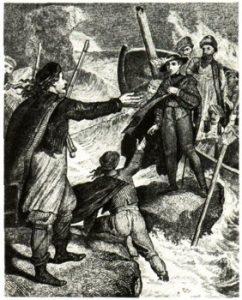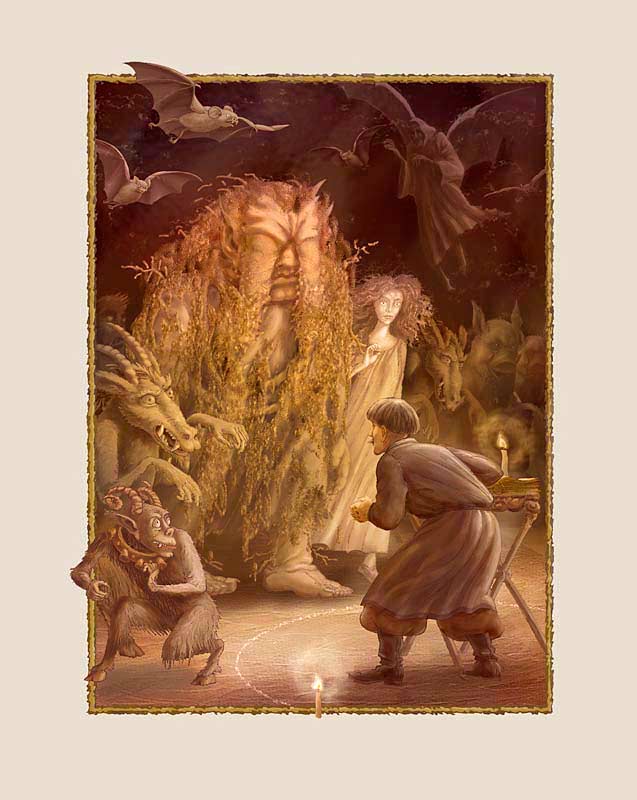Byron “Childe Harold’s Pilgrimage”
 The hero of Byron’s poem Childe Harold’s Pilgrimage is a young aristocrat, full of pleasure and disappointed in life. Leaving the “father’s house”, his “ancient castle”, Harold sits on the ship and says goodbye to his homeland. The agitated lines of “Farewell” convey the senses of the poet himself, who, like his hero, left England without regret with extraordinary force:
The hero of Byron’s poem Childe Harold’s Pilgrimage is a young aristocrat, full of pleasure and disappointed in life. Leaving the “father’s house”, his “ancient castle”, Harold sits on the ship and says goodbye to his homeland. The agitated lines of “Farewell” convey the senses of the poet himself, who, like his hero, left England without regret with extraordinary force:
With you, ship, in a far light
I will rush under the storm howl …
Where? – there is no concern,
Only I would not go home.
(Translated by V. Fisher)
At some point, the feelings of the poet and his hero merge here. But the further the action unfolds, the sharper and clearer the lyrical hero of this work, which embodies the author’s “me”, separates from the image of Harold. Before us is no longer a bored aristocrat, but a freedom-loving poet, with an inquisitive mind and sympathetic hearts. He enthusiastically writes about the Spanish people, who heroically defended their homeland from foreign invaders. He welcomes the city of Cadiks, which “loyalty retained amidst treason” (the people killed the governor-captain and put up courageous resistance to the landing of Napoleon’s troops). In this city, says the poet, everyone behaved nobly, except for the nobility, and no one wanted to wear slave chains, except for capitulation to the enemy of the nobility.
Byron Childe Harold Pilgrimage. Song 1
The main theme of the second song of the poem is the tragic fate of the rebels of Greece against the Turks:
An unfeeling one who, as over the dust of the sweet,
Oh, Greece, not crying over you.
(Translated by V. Fisher)
With bitterness, Byron writes about a Muslim-enslaved country, denouncing the British, who took advantage of the plight of Greece, to take the “weeping gods” – monuments of ancient sculpture to the north.
Childe Harold’s Pilgrimage is one of the most prominent literary monuments of European romanticism. Both the very genre of the lyric-epic poem and the subjective-lyrical moment prevailing in it are characteristic. The personality of the poet appears vividly in the poem, the plot is only externally connected with the image of the central hero. The whole course of action is determined by the free flight of thoughts and feelings of the poet.
“Byron cared little about the plans of his works or didn’t even think about them at all: a few scenes, weakly connected with each other, were enough for him to this abyss of thoughts, feelings and pictures,” wrote A. S. Pushkin. The narration in Childe Harold’s Pilgrimage is extraordinarily emotional. The poet constantly emphasizes his attitude towards the portrayed: he admires and resents, he grieves, protests, calls, continuously interfering in the course of events.
Romanticism of Byron is marked by passion, a hot, active attitude to life. Colorful, picturesque landscapes in the poem. The lush beauty of the Mediterranean, in contrast, confronts the miserable, petty world of selfish interests that prevail in petty-bourgeois England.
Romance willingly enjoyed the reception of contrast. This is one of the artistic means for them to express their rejection of the surrounding reality and the dream of a different, better world – a world of great feelings and high aspirations. At the same time, this is one of the examples of how deeply the local flavor of the romantics was.
The poem was a great success, but the attitude towards it was different. Some readers saw in the poem only a disappointed hero. Others in Byron’s work valued not so much the image of the bored aristocrat Childe Harold, as the pathos of love of freedom that sounded in the poem.
In the 3rd song of the Pilgrimage, the poet addresses the turning point of European history – the fall of Napoleon. Childe Harold visits the site of the Battle of Waterloo. The author reflects on the fact that in this battle both Bonaparte and his victorious opponents defended, not freedom, but tyranny. In this regard, there is the theme of the Great French Revolution, which once nominated Napoleon.
The last, IVth song of Childe Harold’s Pilgrimage, Byron graduated from Venice, where he moved in 1817. This song is almost entirely devoted to Italy: its nature, history, and monuments of art. About his hero, the poet almost completely forgets – the story is entirely on behalf of the author. Turning to the past of Italy, Byron glorifies its great figures, such as Dante and Petrarch, victims of tyranny, like Tacco, courageous freedom fighters like Rienzi. The poet’s indignation is caused by the modern tyrants who enslaved the Italian people.



